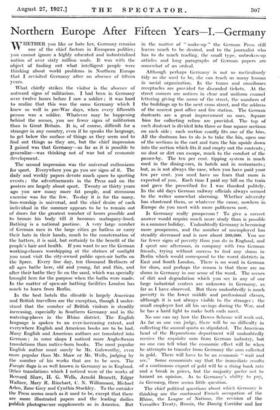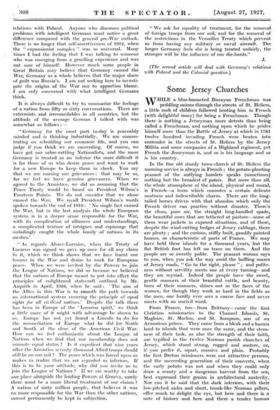Northern Europe After Fifteen Years I. Germany
WHETHER you like or hate her, Germany remains one of the chief factors in European politics ; you cannot ignore a highly educated and industrialized nation of over sixty million souls. It was with the object of finding out what intelligent people were thinking about world problems in Northern Europe that I revisited Germany after an absence of fifteen years.
What chiefly strikes the visitor is the absence of outward signs of militarism. I had been in Germany over twelve hours before I saw a soldier ; it was hard to realize that this was the same Germany which I knew so well in pre-War days, when every fifteenth person was a soldier. Whatever may be happening behind the scenes, you see fewer signs of militarism than in Great Britain. It is, of course, difficult for a stranger in any country, even if he speaks the language, to get below the surface of things as they seem and to find out things as they are, but the chief impression I gained was that Germany—as far as it is possible to generalize—was thinking not of war but of economic development.
The second impression was the universal enthusiasm for sport. Everywhere you go you see signs of it. The daily and weekly papers devote much space to sporting events ; the advertisements in the Press and on the posters are largely about sport. Twenty or thirty years ago you saw many more fat people, and strenuous exercise was for the few. To-day it is for the many. Sun-worship is universal, and the chief desire of each individual in the summer appears to be to remain out of doors for the greatest number of hours possible and to bronze his body till it becomes mahogany-hued. Bathing is a national pastime. A very large number of German men in the large cities go hatless or carry their hats in their hands, much to the consternation of the hatters, it is said, but certainly to the benefit of the people's hair and health.. If you want to see the German working-classes worshipping at the shrines of sunlight you must visit the city-owned public open-air baths on the Spree. Every fine day, ten thousand Berliners of all ages bathe here, old and young, fat and thin, and after their bathe they lie on the sand, which was specially brought here for the purpose when the baths were made. In the matter of open-air bathing facilities London has much to learn from Berlin.
In the best . hotels the clientele is largely American and British travellers are the exception, though I under- stand that the number of British visitors is steadily increasing, especially in Southern Germany and in the watering-places in the Rhine district. The English language is spoken to an ever-increasing extent, and everywhere English and American books are to be had. Many English and American authors are translated into German ; in some shops I noticed more Anglo-Saxon translations than native-born books. The most popular English author must surely be Mr. Galsworthy, even more popular than Mr.. Shaw or Mr. Wells, .judging by the number of his works that are to be seen. The Forsyte Saga is as well known in Germany as in England. Other translations which. I noticed were of the works of Bernard Shaw,. .11. G. Wells, Arnold Bennett, Edgar Wallace, Mary R. Rinehart, C. N. Williamson, Michael Arlen, Zane Grey and Cynthia Stoekley. TO the outsider the Press seems much as it used to be, except that there are more illustrated papers and the - leading dailies publish photogravure supplementS as in America. But in the matter of " make-up " the German Press still leaves much to be desired, and to the journalist who has to do much reading, the small type, unbroken-up articles and long paragraphs of German papers arc somewhat of an ordeal.
Although perhaps Germany is not so meticulously tidy as she used to be, she can teach us many lessons iii social organization. In the trams and omnibuses receptacles are provided for discarded tickets. At the street corners are notices in clear and uniform enamel lettering giving the name of the street, the numbers of the buildings up to the next cross street, and the address Of the nearest post office and fire station. The German dustcarts are a great improvement on ours. Square bins for collecting refuse are provided. The top of each dustcart is divided into three or four square sections on each side ; each section exactly fits one of the bins. All the dustman has to do is to take the bin, open one of the sections in the cart and turn the bin upside down into the section which fits it and empty out the contents ; no dust or dirt can escape, much to the comfort of the passer-by. The ten per cent. tipping system is much used in the dining-cars, in hotels and in restaurants ; but, as is not always the case, when you have paid your ten per cent. you need have no fears that more is expected of you. Each time I paid my bill on the train and gave the prescribed fee I was thanked politely. In the old days German railway officials always seemed to the writer somewhat alarming.. Whether adversity has chastened them, or whatever the cause, nowhere in Europe do you meet with more politeness now.
Is Germany really prosperous ? To give a correct answer would require much more study than is possible in a summer holiday. Undoubtedly Germany is becoming more prosperous, and the number of unemployed has steadily decreased and is now about 500,000. You see far fewer signs of poverty than you do in England, and I spent one afternoon, in company with two German friends, trying without success to find any slums in Berlin which would correspond to the worst districts in East and South London. There is no word in German for slum, and perhaps the reason is that there are no slums in Germany in our sense of the word. The scenes of dirt and degradation which you see in any of our large industrial centres are unknown in Germany, as far as I have observed. But there undoubtedly is much poverty in the lower middle and professional classes, although it is not always visible to the stranger ; the small employer lost all his savings during the War, and he has a hard fight to make both ends meet.
No one can say how the Dawes Scheme will work out. As far as one can judge, there will be no difficulty in collecting the annual quota as stipulated. The American head of the Reparations department will undoubtedly receive the requisite sum from German industry, but no one can tell what the economic effect will be when he attempts to transfer from Germany the sum collected in gold. There will have to be an economic " wait and see." Some economists say that the immediate results of a continuous export of gold will be a rising bank rate and a break in prices, but the majority prefer not to hazard an opinion. As to Germany's ability to pay, in Germany, there seems little question.
The chief political questions about which Germany is thinking are the continued French occupation of the Rhine, the League of Nations, the revision of the Versailles Treaty, Russia, the Danzig Corridor and her relations with Poland. Anyone who discusses political- problems with intelligent Germans must notice a great difference compared with the general pre-War outlook. There is no longer that self-assertiveness of 1912, when the " expansionist complex " was so universal. Many times I had the feeling that I was talking to someone who was emerging from a gruelling experience and was not sure of himself. However much some people in Great Britain may believe that Germany caused the War, Germany as a whole believes that the major share of guilt was Russia's. I am not seeking here to investi- gate the origins of the War nor to apportion blame. I am only concerned with what intelligent Germans think. • It is always difficult to try to summarize the feelings of a nation from fifty or sixty conversations. There are extremists-and irreconcilables - -in all countries, but the attitude of the average German I talked with was somewhat as follows :- "Germany for the most part to-day is peaceably minded and is thinking industrially. We are concen- trating on rebuilding our economic life, and you can judge if you think we are succeeding. Of course, we have got our sabre-rattling Nationalists, and the more Germany is treated as an inferior the more difficult it is for those of • us who desire peace and want to work for a new Europe to keep them in check. You say that we are nursing our grievances : that may be so, for we feel we have genuine grievances. When we agreed to the Armistice,- we did so assuming that the Peace Treaty would -be based on President Wilson's Fourteen. Points. We do not consider that we alone caused the War. We recall President Wilson's words spoken towards the end of 1916: No single. fact caused- the War, but in the last analysis the whole European system is in a deeper sense responsible for the War, with its complication of alliances and understandings, a complicated texture of intrigues and espionage that unfailingly caught --the whole family of nations in its meshes.'
" As regards Alsace-Lorraine, when the Treaty of Locarno was signed we gave up once for all any claim to it, which we' think shows that we have learnt our lessons in the War and desire to work for European peace. When we were invited by the Powers to join the League of Nations, we did so because we believed that the -nations of Europe meant to put into effect the principles of enlightened statecraft outlined by Mr. Asquith in April, 1916, when he said : The aim of the Allies in this War is to smooth the path towards an international system ensuring the principle of equal rights for all civilized nations.' Despite the talk there has been in Europe of the Locarno spirit,' we think a little more of it- might with advantage be shown •to us. Europe has -not yet found a Lincoln to do-for the reconciliation of Europe what he did for North and South at the close of the American Civil- -War. How can we feel enthusiastic about the -League •of Nations when we -find that our membership does not connote equal status ? Is it expedient that nine years after the Armistice seventy thousand Allied troops should still be on our soil ? The peace which was forced upon us makes us realize that we are regarded as inferiors. If this is to be your attitude, why did you invite us to join the League of Nations ? If we are -worthy- to take our place alongside the leading- Powers • at Geneva, surely there must. be a more liberal treatment of our claims ? A nation of sixty million people, -that believes it . was -no -more responsible for the War than the. other- nations, cannot permanentlY be kept in subjection. " We ask for equality of treatment, for the removal . of foreign troops from our soil, and for the removal of the restrictions in the Versailles Treaty which prevent us from having any military or naval • aircraft. The longer Germany feels she is being treated unfairly, the stronger will be the influence of our die-hards." .
J.- (The 'second article will deal with. Germany's' relations with Poland and the Colonial* question.)



































 Previous page
Previous page